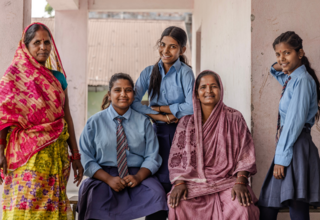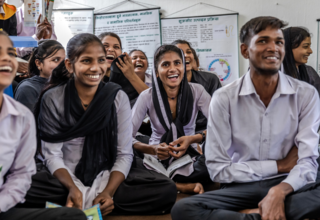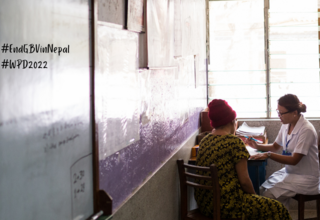Not even the massive April earthquake could stop the determination of the National Health Training Center and Family Health Division to continue investing on adolescent sexual and reproductive health (ASRH) in Nepal. A partnership implemented through Adventist Development and Relief Agency with technical and financial support from UNFPA, the United Nations Population Fund, was built on strong common determination to improve the quality of services on sexual reproductive health provided to adolescents in order to broaden its outreach to an age group that deserves attention in the country.
The Government of Nepal is committed to improve availability of adolescent-friendly health services. As part of this goal, three intensive five-day Master Trainings of Trainers (MToT) on ASRH was conducted in Dhulikhel, Kavre, with the purpose of preparing four to six clinical trainers at six training sites in order to scale up services providers' competencies on ASRH across the country.
A new ASRH training manual package, which includes a trainer's guide, a participant's handbook and a reference material has been developed under the leadership of the National Health Training Center (NHTC). The revision of the manual is based on evidence of the recent Barrier Study on ASRH by using a qualitative participatory method that explored the demands, hurdles and enablers of adolescent friendly health services utilization by adolescents. The study showed that there is "a gap in the access to services, including a lack of information about the health services available for adolescents" says Manju Karmacharya, ASRH programme officer at UNFPA Nepal, who actively collaborated in the revision process.
An essential further stage was the pre-testing of the training package throughout two batches of MToT on ASRH conducted in February and March this year, which incorporated participants' valuable feedback on the revision process of ASRH manual development. The revised training package was endorsed in April before initiating the 3rd batch of MToT through the Technical Working Group. The third MToT abruptly interrupted by the earthquake on 25 April was resumed in July and was led confidently with the revised training package. The training's last batch coincided with the launch of the manual on 28 July by Dr. Pushpa Chaudhary, Director of Family Health Division (FHD); Giulia Vallese, UNFPA Representative and Dr. Ishwor Upadhaya, a master trainer at NHTC. This is considered a great achievement for developing a new pool of trainers on ASRH at the regional and national level for the first time in Nepal.
Tulasi Khadka, a trainer at ADRA Nepal, working on family planning with various women girls and participant at this year's third MToT, says, "It is important to intensify ASRH services. Throughout my work I see many middle-aged women dealing with SRH problems that could have been avoided if they would have received some guidance as adolescents."
According to Nepal Demographic Health Survey 2011 and Nepal Adolescent and Youth Survey 2012, only 26% of adolescent girls have a comprehensive knowledge about HIV/AIDS against 34% of adolescent boys in Nepal . "Currently the problem is that SRH education given in schools is not reaching a high level," says Ragishree Kachhapati an ASRH trainer. "Teachers are not aware of all the issues faced by adolescents".
Another challenge in ASRH is the predominance of a whole system of values and cultural beliefs that can prevent the young generation to access the information and services they need. Adolescents fear addressing issues on reproductive health because of judgmental reactions from parents or community members. Moreover, according to the Barrier Study, some health care providers themselves don't feel comfortable talking about certain issues such as contraceptive methods to unmarried girls. "Health workers need special skills to approach adolescents," says Dr. Chaudhary during the launch of the ASRH training package.
Conscious of the need to reach out to adolescents and ensure that services are more accessible and friendly towards young people, the new method strongly focuses on how to communicate sensitive aspects of sexual reproductive health with adolescents. According to Dr. Ishwor Upadhaya, a NHTC master trainer, the main characteristic is that it is a skilled competency based programme. The participants have to increase their communication skills with adolescents, meaning counseling and problem solving skills using the Job Aid developed by the WHO and adopted in the Nepali context."
A five-day ASRH training roll-out started in different clinical training sites across the country in mid-August, allowing some of the master trainers from this years' MToT sessions to test their skills as trainers on ASRH. This process follows a five-step process (whole site orientation, establishment of adolescent-friendly centers, onsite training, training for service provider's from adolescent friendly service (AFS) centers and certification of AFS center).
"I feel confident about the training and the knowledge I have acquired on ASRH" says Indira Dhungel, a graduate from the third MToT, who facilitated a session on concerns and issues of adolescents about ASRH during the five-day onsite training for doctors and nursing in-charges of the training at the Maternity Hospital in Thapathali, Kathmandu.
The whole site orientations at clinical training sites support hospital management, directors as well as in-charges of medical, nursing and paramedics in creating a welcoming environment for adolescents to receive "friendly" services. The ultimate goal is to certify the AFS centers using a quality improvement and certification tool recently endorsed through FHD.
The training package include case studies, role-playing, event studies and small group discussions in order to engage actively doctors and nursing in-charges on ASRH. "The training is interesting, participatory and specific. It allows us to increase our knowledge on adolescent issues that are not highlighted enough" says Nani Maiya Kaway, a midwife at the maternity and women's hospital and the nursing in-charge of the operation theater. Dr. Sunita Rai, doctor and senior house officer at Paropakar maternity and women's hospital, also says that adolescents come here and they are very shy and don't know how to communicate, here we are learning how to ask questions and allow adolescents to open up so that they can express their concerns and issues.
RELATED NEWS:
ASRH programme reaches 14 UNFPA-supported districts in Nepal
Harnessing mobile technology to improve ASRH knowledge in Nepal



